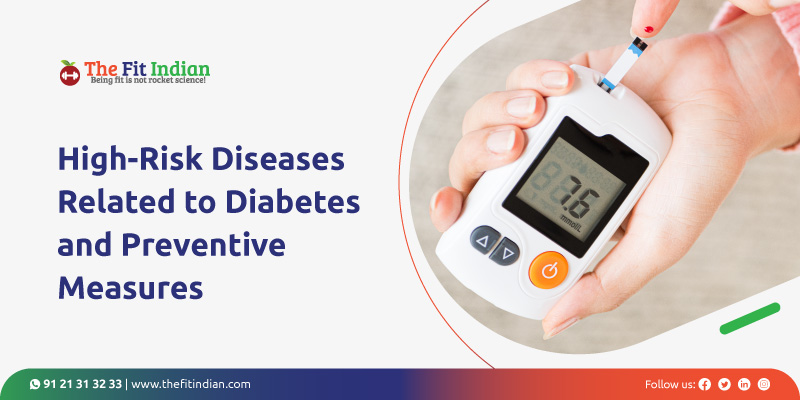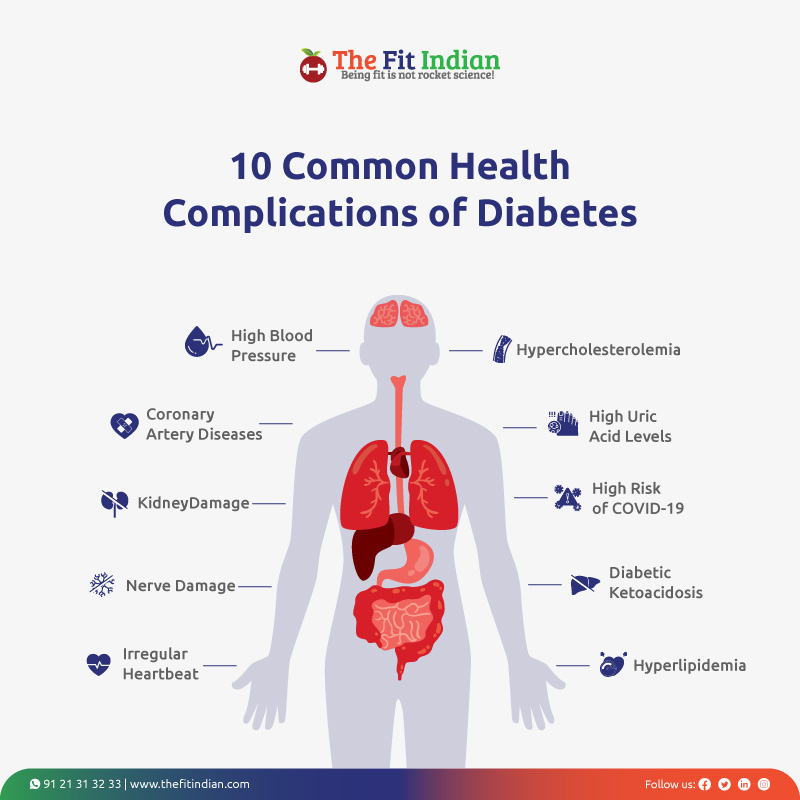10 Worst Complications of Diabetes & How to Prevent Them Happening
Reviewed by: Dr. T S Deepthi Sarojini | Author: Manoja Kalakanti
We have come a long way from the days when the understanding of diabetes, its consequences and the relation it shares with other conditions were not well understood. But over the years, our perspective has changed due to knowledge gained through decades of research and studies. This knowledge, coupled with a robust healthcare system, has significantly reduced severe complications and deaths due to the condition. Thanks to this awareness of diabetes complications and management, people with diabetes now live longer and healthier lives than ever before. So, what are the 10 high-risk diseases related to diabetes? And what are the steps that you can take to prevent these complications? Read on to find out!

In this article, we’ll talk about the complications of diabetes and the preventive measures to avoid the condition. We have also provided a diet plan to manage kidney problems – one of the most severe consequences of diabetes.
10 High-Risk Diseases Related to Diabetes
If not managed properly, diabetes, in the long run, can cause major health problems. The probability of severe illness and even death increases exponentially if you are affected by conditions such as hypertension, strokes, kidney, nerves and heart diseases along with diabetes. PCOS (Polycystic Ovary Syndrome) is another condition that is related to diabetes. Insulin resistance is often the driving factor behind the condition. Over time, diabetes can affect any part of the body; hence, it must be controlled from the early stages.

Understanding the consequences of not managing diabetes can instil a sense of responsibility towards better control of the condition. The following are some of the most common diseases related to diabetes. These conditions could result in a severe health crisis, even resulting in death.
1. High Blood Pressure
High blood pressure or hypertension is one of the most common consequences of diabetes. In the long run, diabetes can damage the blood vessels, thus causing pressure to build up, which results in high blood pressure. Hypertension along with diabetes can increase the risk of heart attack, stroke, kidney disease and Alzheimer’s disease. You can prevent hypertension with lifestyle changes, especially diet.
2. Coronary Artery Diseases
Diabetes is closely related to coronary artery diseases. These conditions are also associated with other problems such as obesity and hypertension. If not properly managed, diabetes can result in CAD. Long-term diabetes can damage the blood vessels. If you have diabetes, your body will be unable to use all the excess sugar, which then gets attached to the red blood cells in your blood. This blocks the vessels that carry blood to your heart, thus depriving it of nutrients and oxygen. To prevent this from happening, check your blood glucose levels, cholesterol levels and blood pressure levels regularly. You must also lead a healthy life with adequate exercise and a healthy diet.
3. Kidney Damage
Your kidneys have millions of blood vessels that are responsible for filtering the waste from the blood. Damage to these vessels can impair the kidney’s ability to function properly and may even lead to kidney failure. This condition is called diabetic nephropathy. If diabetes is not controlled properly, it may cause damage to the blood vessels, which may lead to high blood pressure; this, in turn, causes more damage to the kidneys. You can prevent this by properly managing diabetes, your weight and your blood pressure.
4. Nerve Damage
Nerve damage or diabetic neuropathy is another condition that can manifest if diabetes is poorly managed. High blood sugar can cause damage to nerves, especially in the feet and legs. It often results in pain or numbness in the hands or feet. While this usually results in minor discomfort, it could also be extremely painful and disabling. You can prevent or manage it by leading a healthy lifestyle.
5. Irregular Heartbeat
Studies have suggested that people with diabetes are more likely to develop atrial fibrillation, which is the most common form of irregular heartbeat. Diagnosing the condition at the right time could prevent stroke.
6. Hypercholesterolemia
Hypercholesterolemia means a high blood cholesterol level. High cholesterol levels can increase the risk of heart attacks and strokes. The levels are higher in people with diabetes.
7. High Uric Acid Levels
Elevated serum uric acid (SUA) levels or hyperuricemia can predict the onset of type 2 diabetes. Studies suggest that people with high uric acid levels in their blood are more likely to develop diabetes. It has been linked to micro-and macrovascular complications in people with diabetes.
8. High Risk of COVID-19
Over the course of time during the COVID-19 pandemic, it was observed that people with certain conditions such as diabetes, hypertension and obesity are at a higher risk of getting infected by the coronavirus. Not only this, but such people were at a higher risk of developing severe health complications and even mortality. People with diabetes and other complications such as heart disease are more vulnerable. Managing your condition can lower the risk substantially.
9. Diabetic Ketoacidosis
Diabetic ketoacidosis is a condition where your body is unable to produce enough insulin. It occurs when your body produces high levels of blood acids called ketones. Look out for the symptoms of high ketone levels and get help immediately if necessary. Managing diabetes, controlling blood sugar levels and checking your ketone levels can prevent any emergency.
10. Hyperlipidemia
Hyperlipidemia is a condition where your blood has excess lipids or fats such as cholesterol and triglycerides. This condition increases fatty deposits in arteries and thus may cause blockages. It is a type of coronary artery disease that is a common cause of death among people with diabetes.
The best way to keep type 2 diabetes health risks at bay is through prevention. Read on to learn the simple yet effective ways to properly manage the condition to prevent the high-risk diseases related to diabetes
How to Prevent Complications of Diabetes
It goes without saying that preventing diabetes itself should be the first and foremost step. But if you are afflicted with the condition, the next step is to rein in the condition through preventive measures. Understanding the causes of diabetes mellitus can also be an effective strategy to avoid it. A lot can be achieved in diabetes management with a little change in your routines and consistency and dedication.

HbA1c is your average blood glucose level for the last couple of months. If you have diabetes, an ideal HbA1c level is 48mmol/mol. Keep a track of this level and try to keep it within the healthy limit. Follow a healthy lifestyle. Practice meditation/yoga, avoid alcohol and smoking, try stress management, and get enough sleep. The following steps can help you further ensure that your diabetes is under control.
1. Healthy Diet Plan
A healthy, nutritious diet is crucial for everyone, especially for people with diabetes. A proper meal plan would include whole foods such as fruits, vegetables, whole grains, nuts and more. Adequate water intake is also vital. Avoid or limit sugar and refined grains such as white bread, pasta and white rice. Also, avoid processed foods. Eat complex carbs instead of simple carbohydrates. Complex carbs include beans, whole grains and vegetables.
2. Staying Physically Active
Staying physically active can be good for your overall health, including managing diabetes. This could help control blood sugar levels and lower the risk of other diseases such as heart diseases and hypertension. Even 30 minutes of exercise each day can be extremely helpful. You can take a walk, do household chores, dance, or play any sport to stay fit.
3. Manage Weight
Unhealthy weight is one of the factors behind several conditions such as hypertension, diabetes and heart diseases. Even losing a small number of kilos can help in managing blood sugar, blood pressure and other problems. You can follow a healthy diet and exercise regularly to reduce your weight.
4. Get Regular Health Check-ups
It is crucial to get a health check-up and get your doctor’s advice on a regular basis when you have diabetes. You can check your glucose levels through various tests such as – fasting, post lunch and RBS (random blood sugar) test. This can help you keep track of the condition and give crucial insights. Maintain regular appointments and track of medicines and treatment options.
5. Control Blood Pressure and Cholesterol Levels
This is perhaps the most vital component of diabetes precautions. The best way to ensure that the complications are well controlled is to regularly check your blood pressure and cholesterol levels. High blood pressure and cholesterol levels for a prolonged time could result in heart diseases, stroke and more health complications.
You can get help from your doctor for building a plan. Since kidney damage is one of the most severe consequences of the condition, we have created a detailed diet plan for people with diabetes who have kidney problems.
Diet Plan For Preventing Kidney Damage
If you have diabetes, your doctor is likely to suggest an appointment with a dietician or a nutritionist. Diet can be a diabetes risk factor that leads to the condition while also being one of the most vital aspects in managing it. A diet to manage the condition is a whole food rich, healthy diet consisting of fruits, vegetables and whole grains.

The following diet plan is not a general diabetic diet but specifically for patients with kidney problems due to diabetes. You can also check the best eating tips for diabetes management along with a diet plan.
Diet Plan for people with diabetes and kidney problems (1300 kcals)
| Meals | Portion size |
| Early morning | Lukewarm water with a teaspoon of methi seed powder
1 cup tea with cardamom or coffee without sugar Benefits: Methi powder has a natural ability to regulate blood sugar levels. It facilitates weight loss, is good for your liver, kidneys and metabolism. Cardamom aids in asthma, kidney stones and toothache Calories : 52 kcals approximately |
| Breakfast | A bowl of oats porridge with 1 egg white
or 3 idlis with 3 tsp mint chutney or 1 missi roti with onion chutney Benefits: In breakfast, eat a combination of fibre and good proteins. Oats, missi roti and idli with mint and onion chutney are best foods for diabetes and kidney issues. Calories: 230 kcals approximately |
| Mid morning | 1 big serving of apple with 1 cup herbal tea / 1 cup plums with black tea
Benefits: Apple and plums are rich in antioxidants which protect the cells of the kidney from oxidative damage. It is beneficial in controlling blood sugar levels in a diabetic and it has blends of carbohydrates that are slowly digestible. This makes for a filling and a satisfying snack. Calories: Apple – 100 kcals (approx) and Plum gives 80 kcals (approx) |
| Lunch | 1 bowl of salad + 2 Chapatis/Phulkas + 1 big bowl of vegetable curry
+ 1 bowl of Dal (moong dal)/ Chicken/ Egg curry or 1 bowl of soft cooked khichdi +1 big bowl of boiled cabbage salad with vegetable raita Benefits: Green leafy vegetables are rich in fibre, vitamins ,phytochemicals and phytonutrients. Lean chicken and eggs should be preferred moderately to obtain good quality of protein. Cabbage is rich in fibre and vitamin-c, it is also good for kidney health. Calories: 400 kcals approximately |
| Evening | 2 slices toasted wheat bread toasted stuffed (cucumber,onion,cabbage chopped)along with coriander chutney and 1 cup green tea.
Benefits: Bread will most often contain insoluble fibre. It is low in glycemic index, provides energy, reduces blood sugar Calories: 200 kcals approximately |
| Dinner | 2 Chapatis/phulkas + 1 bowl of salad + 1 bowl ridge gourd curry
Benefits: Dinner should be simple with phulka and salad which is easy for digestion. It relieves constipation, enhances vision. Calories: 300 kcals approximately |
| Bedtime | Warm water – 1 glass
Benefits: Improves digestion, great for everyday aches and pains |
You can get nutritional support from a certified nutritionist for further details on dietary management or a comprehensive diet plan customized for you.
Bottomline
The implications of poor diabetes management are manifold. Over time it can lead to severe health disorders such as kidney problems, heart diseases, stroke, and hypertension. So, preventing the condition must be the primary goal. Fortunately, even if the condition does occur, type 2 diabetes can be controlled by taking certain measures like changing your lifestyle, including diet. Through these modifications, you can not only ward off the high-risk diseases related to diabetes, but you can also lead a normal life.
FAQ’s
1. What are the risks of diabetes?
Long term diabetes can result in many severe health consequences. Some of the risks are:
- Cardiovascular disease
- Kidney damage
- Nerve damage
- Eye damage
- Foot damage
- Alzheimer’s disease
2. Which is worse, type 1 or 2 diabetes?
Type 2 diabetes is usually considered to be easier to control and to be less severe. But, if not well managed, it can also lead to significant health problems such as heart diseases, stroke, eye problems and hypertension.
3. How does obesity increase the risk of diabetes?
Obesity can increase the levels of fatty acids and inflammation. This can lead to insulin resistance, which in turn leads to diabetes.
4. Can diabetes be related to kidney problems?
Diabetes, if not well managed, can damage the blood vessels in your kidneys. This could impair the ability of the kidneys to function properly. The condition can also lead to high blood pressure, which can damage your kidneys.
5. How does diabetes cause foot problems?
Long term diabetes, if managed poorly, can result in nerve damage (diabetic neuropathy). This may cause a tingling sensation and a loss of feeling in your feet. Hence, it may be difficult to sense an injury or blisters, which may lead the injury to worsen.
6. Can thyroid problems cause diabetes?
Thyroid problems can affect your metabolism, which can affect your blood glucose levels. Thus it increases the risk of diabetes.
7. Does diabetes cause gastric problems?
Yes. Diabetes can cause heartburn, bloating and other gastric issues. It can also lead to gastroparesis, a condition that affects your digestive system.
8. Does diabetes cause liver problems?
Yes, diabetes can cause several liver-related problems. It can result in fatty liver disease, cirrhosis, acute liver failure and other liver diseases.
9. At what age does diabetes most often appear?
Diabetes can occur at any age, even in childhood. But generally, it develops in middle-aged and older adults above the age of 45. The risks are greater if you are obese or carry any other risk factors.
10. Can type 2 diabetes go away?
There is no cure for type 2 diabetes. But with proper management, the sugar levels can be brought under control, and you can lead a healthy life.




Manoja Kalakanti